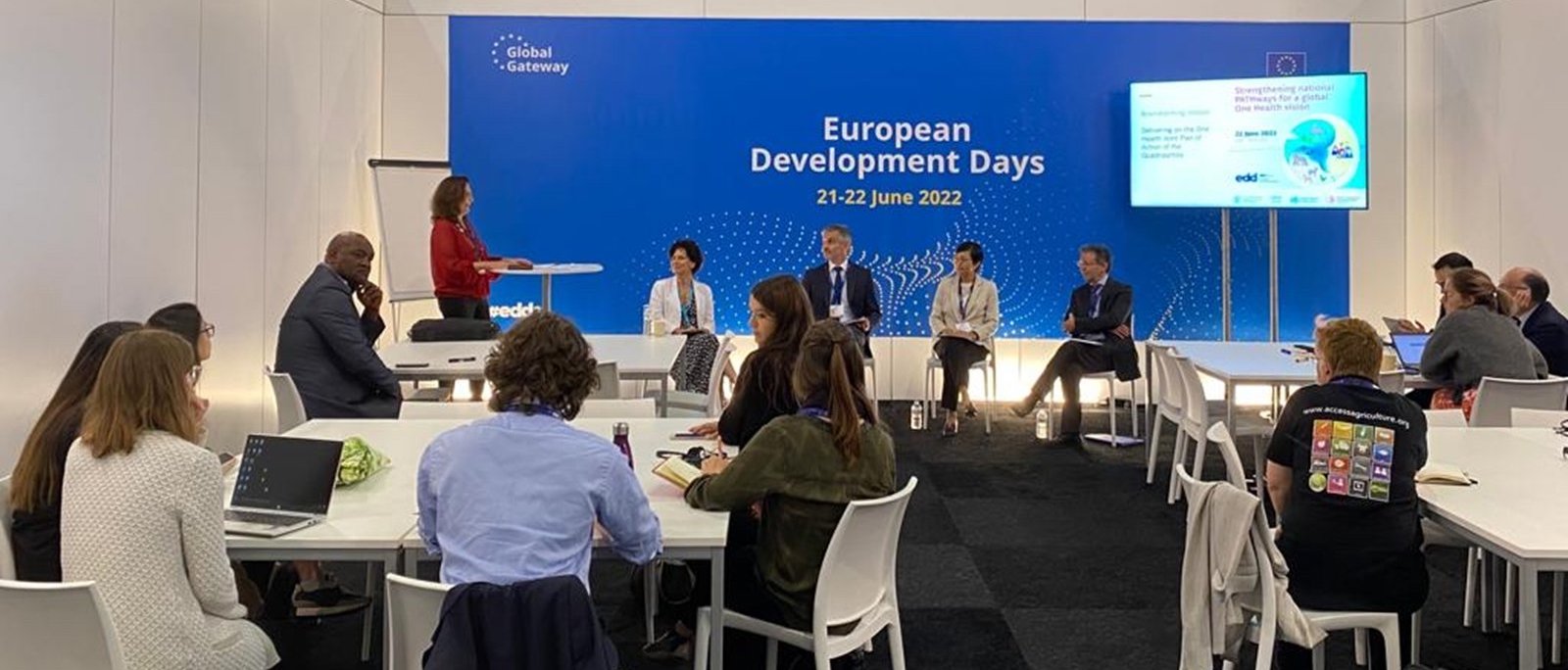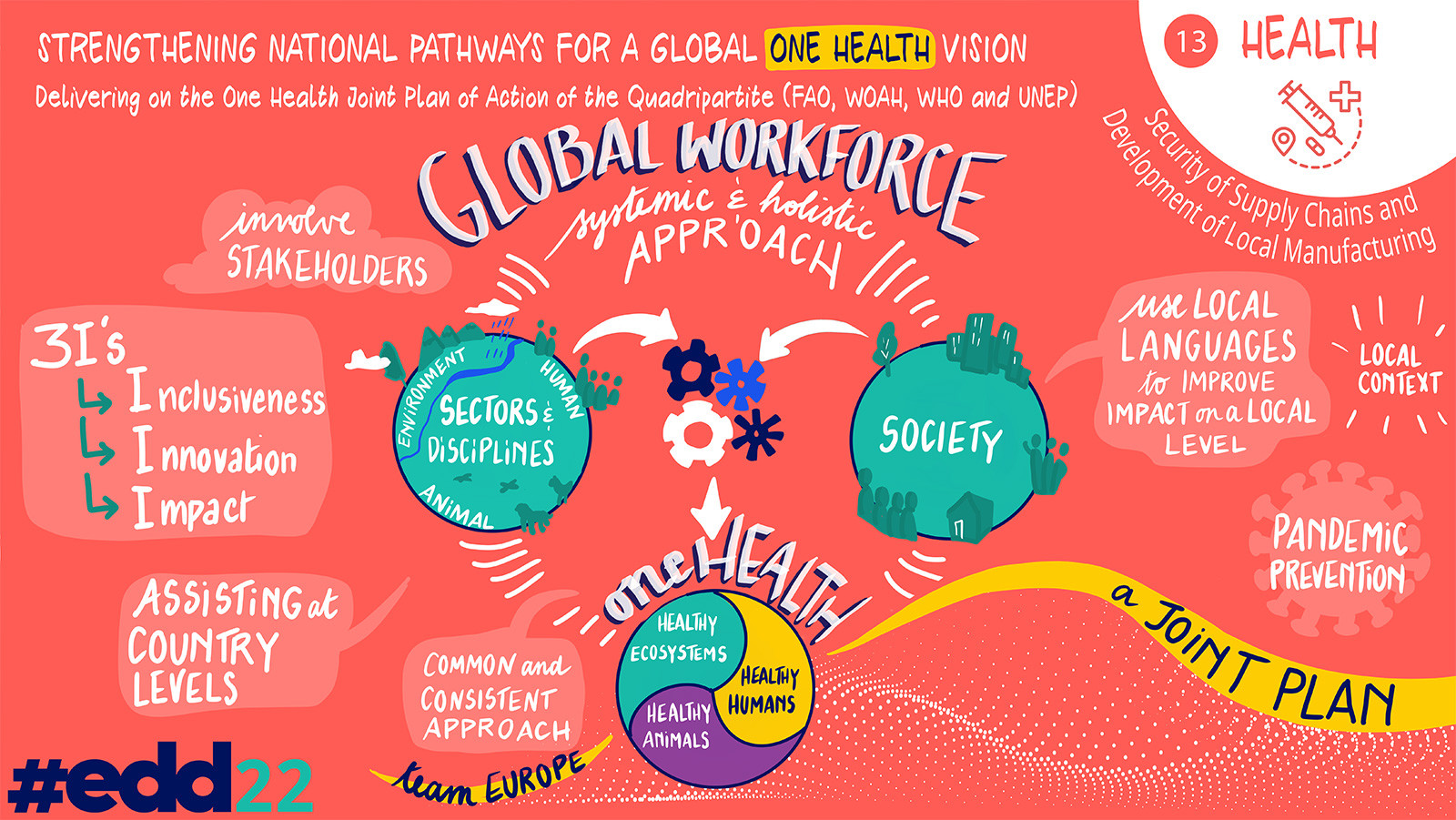
The Food and Agriculture Organization of the United Nations (FAO), the United Nations Environment Programme (UNEP), the World Health Organization (WHO) and the World Organisation for Animal Health (WOAH) organised a session on delivering on the One Health Joint Plan of Action (OH JPA) of the Quadripartite at the European Development Days (EDDs) on June 22nd in Brussels.
Developed by the Quadripartite, the OH JPA intends to guide the four organizations to work together on One Health with the aim of supporting their Members and key stakeholders to strengthen One Health capacities, policies, approaches and leverage the needed investments to mainstream One Health globally and locally. It provides a framework for action and proposes a set of activities and integrated package of services that the four organizations can offer together to advance and sustainably scale up One Health.
The session was moderated by Dr. Andrea Winkler, Professor at the Technical University of Munich, and speakers included Ms. Carla Montesi, Director for Green Deal and Digital Agenda at DG International Partnerships (DG INTPA), Dr. Keith Sumption, FAO Chief Veterinary Officer, Dr. Budimir Plavsic, WOAH Regional Representative for Europe, Ms. Janyl Moldalieva, Policy Officer at UNEP, and Mr. Peter Sousa Hoejskov, Technical Officer at WHO. More information about the session is available here.
 Prof. Dr. Andrea Winkler, Technical University of Munich, introducing the EDD session organised by the FAO, WOAH, WHO, and UNEP
Prof. Dr. Andrea Winkler, Technical University of Munich, introducing the EDD session organised by the FAO, WOAH, WHO, and UNEP
WCS's Arnaud Goessens, Associate Director for EU Policy, was invited to intervene and highlighted the need for significant investments to bridge knowledge on modern holistic One Health framing and the need to explore structural changes across administrations in order to enable One Health approaches. Building on a consensus One Health approach (e.g., based on the Berlin Principles and the One Health High-Level Expert Panel definition), there is a need for cross-sectoral funding streams in order to mainstream One Health across all policies and sectors. To reduce risk of future pandemics of zoonotic origin, he stressed the importance of prevention at source and the critical need to protect ecosystems with high ecological integrity such as intact forests. He also emphasised the need to improve disease and zoonotic-origin pathogens detection through data collection, analysis, and sharing. The WildHealthNet tool, developed by WCS, facilitates data integration from the environment-health nexus and the spillover frontlines with existing public health networks while bridging and building capacity across national and regional administrations. The WildHealthNet has been successfully implemented in Southeast Asia and is now being trialed with government partners in Latin America, specifically, in Peru and Guatemala.
 Arnaud Goessens, WCS EU, speaking at an EDD session organised by the FAO, WOAH, WHO, and UNEP (© Nelea Motriuc / FAO)
Arnaud Goessens, WCS EU, speaking at an EDD session organised by the FAO, WOAH, WHO, and UNEP (© Nelea Motriuc / FAO)
Increased support is needed to scale-up locally-produced, sustainable non-wildlife high quality, nutritious food, to enhance food security and reduce dependence on wild meat, particular for Indigenous Peoples and local communities (IPLCs), as one of a number of One Health approaches. The EU is already leading efforts in this area through the seven-year Sustainable Wildlife Management (SWM) Programme, funded by the EU and the Organisation of African, Caribbean and Pacific States (OACPS). SWM is developing innovative, collaborative, and scalable new models to conserve wildlife and improve food security for IPLCs. SWM is being implemented by the FAO, the Centre for International Forestry Research (CIFOR), the French Agricultural Research Centre for International Development (CIRAD) and WCS.
Visual summary of the main outcomes of the session

Contact:
Arnaud Goessens: agoessens@wcs.org
READ MORE
WCS Health Programs
WCS Briefing: One Health in Action
WCS Policy: Preventing Epidemics and Pandemics of Zoonotic Origin
The Berlin Principles on One Health, 2019
Sustainable Wildlife Management (SWM) Programme
WildHealthNet